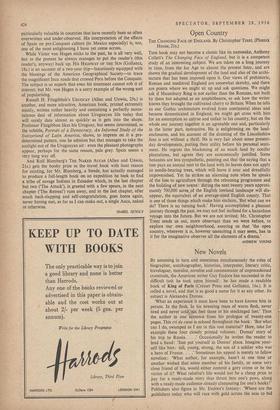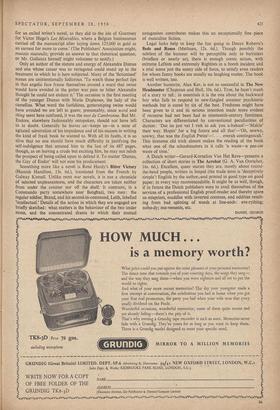New Novels
BY assuming in turn and sometimes simultaneously the roles of biographer, autobiographer, historian, interpreter, literary critic, traveloguer, moralist, novelist and commentator of unprecedented crassitude, the American writer Guy Endore has succeeded in the difficult task he took upon himself : he has made a readable book of King of Paris (Cresset Press and Gollancz, 16s.). It is called a novel, and that is as good a name for it as any other. Its subject is Alexandre Dumas.
'What an experience it must have been to have known him in person. In the flesh. In his towering mass of warm flesh, never tired and never cold, six feet three in his stockinged feet.' Thus the author in one sentence from his prologue of twenty-one pages. This cri de mar is echoed throughout the book : 'But what can I do, swamped as I am in this vast material? Here, take for example these four closely printed volumes : Dumas' story of his trip to Russia. . . .' Occasionally he invites the reader to lend a hand : 'Just put yourself in Dumas' place. Imagine your- self like him : tall, young, strong, the son of a soldier who was ' a hero of France. . . .' Sometimes his appeal is merely to fellow novelists: 'What author, for example, hasn't at one time or another wished that some member of his family, or some very close friend of his, would either commit a gory crime or be the victim of it? What relative's life would not be a cheap price to pay for a ready-made story thus thrust into one's paws, along with a ready-made audience already clamouring for one's books?' Publishers also figure in Mr. Endore's fantasy : 'Where are the publishers today who will race with gold across the seas to bid us in doubt. Generally he leaves us—keeps us—in a state of agitated admiration of his impudence and of his success in writing the kind of freak book he wanted to. With all its faults, it is so alive that no one should have much difficulty in justifying the self-indulgence that amused him to the last of its 487 pages, though, as on leaving a crude but exciting film, he may not relish waste of time.'
Something more like a novel is Rend Hardy's Bitter Victory (Hamish Hamilton, 13s. 6d.), translated from the French by Galway Kinnell. Unlike most war novels, it is not a chronicle
of selected unpleasantness, and the characters are taken neither
from under the counter nor off the shelf. It contrasts, in a Commando party somewhere near Benghazi, two men : the regular soldier, Brand, and his second-in-command, Leith, labelled 'intellectual.' Details of the action in which they are engaged are briefly sketched: what matters is the behaviour of the two under nobo-dy; mo-vements, etc. diction : iss just vat I vish to ask you a-bahnot'—'Makin' their way. Hopin' for a big future and all that'—'Oh, sowwy,
sowwy, that was the English Pwize'—'. . . everah contingencah.'
This tiresome old trick almost makes the reading of the book what one of the schoolmasters in it calls 'a waste—a pee-Aw A Dutch writer—Gerard-Kornelius Van Het Reve—presents a 16s. 6d.). Excellent, queer stories they are, mostly about round- the-bend people, written in limpid (the trade term is 'deceptively simple') English by the author, and printed in good type on good paper; in every way recommendable. It might be as well, though, if in future the Dutch publishers were to avail themselves of the services of a professional English proof-reader and thereby spare us misprints, muddles with inverted commas, and oddities result- ing from bad splitting of words at line-ends: eve-rything;



































 Previous page
Previous page